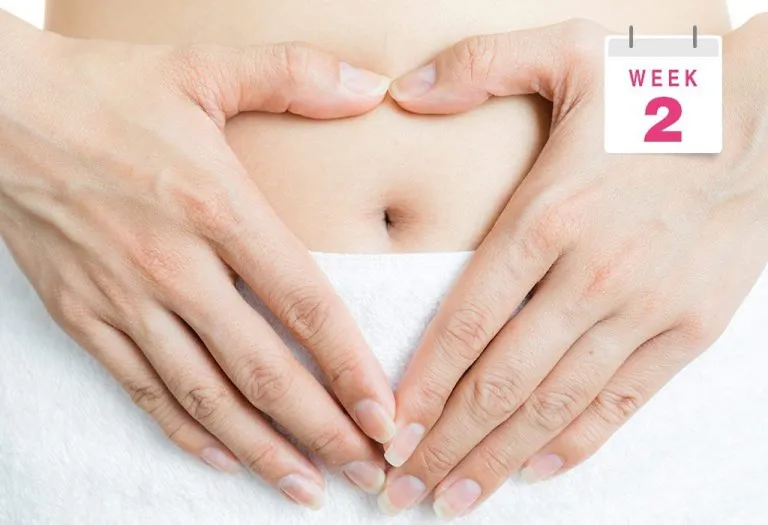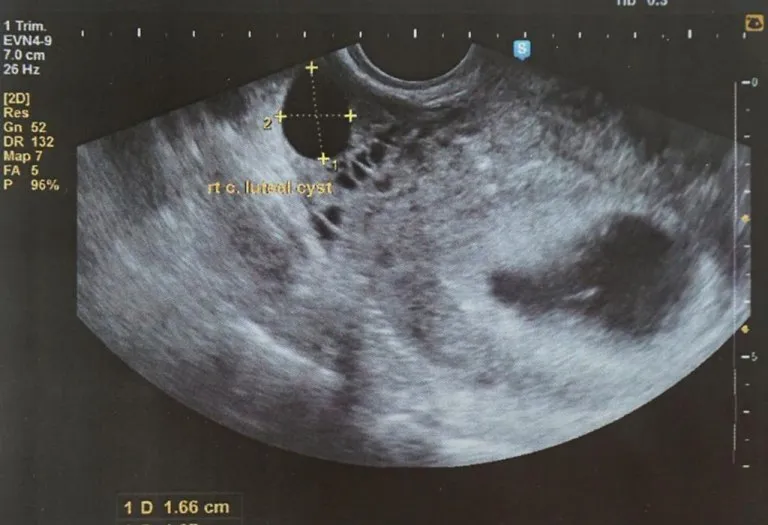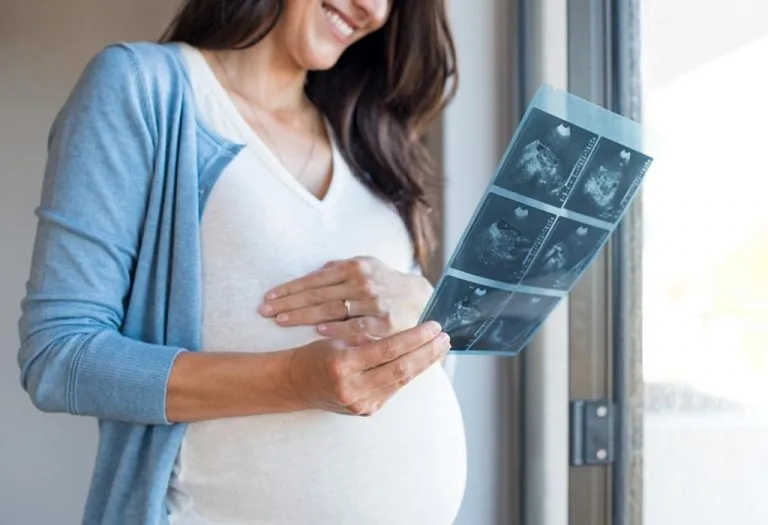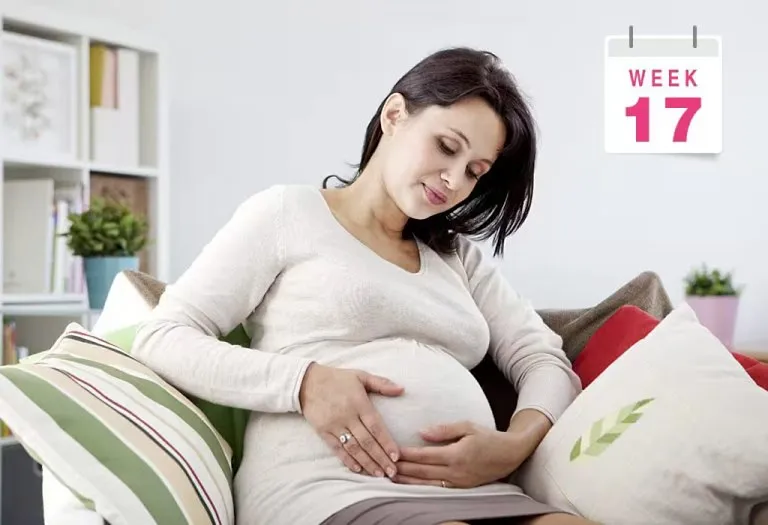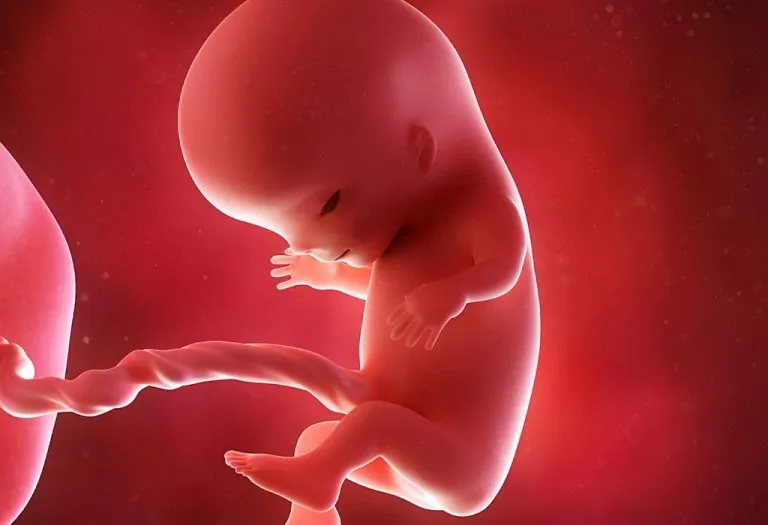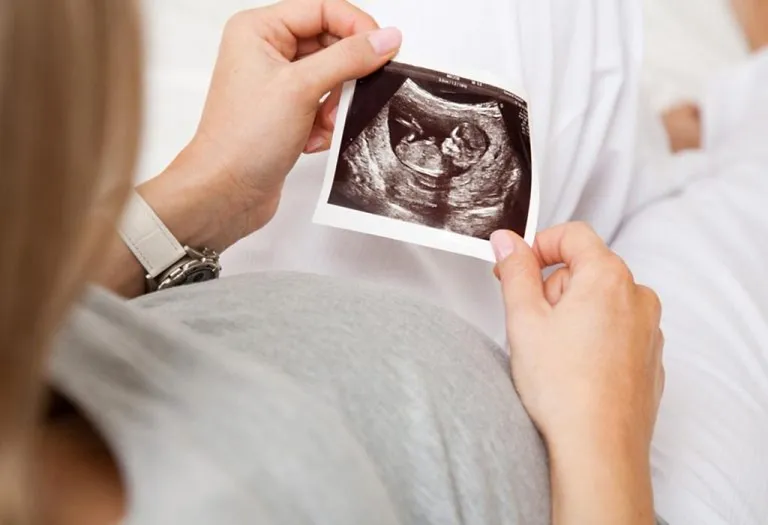2 Weeks Pregnant – Symptoms, Baby Size & Care Tips

- Your Baby During Week 2 of Pregnancy
- What Is the Size of the Baby at Week 2 of Pregnancy?
- Common Body Changes at Week 2 of Pregnancy
- Symptoms of Pregnancy at Week 2
- Belly at Week 2 of Pregnancy
- Ultrasound at Week 2 of Pregnancy
- Diet at Week 2 of Pregnancy
- Week 2 of Pregnancy – Tips & Care
- Things You Need to Buy for Week 2 of Pregnancy
- When to Consult the Doctor
- FAQs
Being pregnant is an exciting, scary, and humbling experience. It’s an adventure into the unknown and the unexpected. Each week, you’re going to learn more and more about the world around you and your own body, with each stage bringing new insights and discoveries. We’re here to help reduce those fears and support you through this joyous ride to the future by providing as much knowledge as we can every week. In this article, we shall share all that you need to know about week 2 of pregnancy. Let’s begin with what changes the baby goes through at week 2 and what you can expect during this early stage.
Your Baby During Week 2 of Pregnancy
Welcome to the beginning. That’s right, you’re about to the start the most exciting journey any human has ever had, and it’s going to be filled with thrills, chills, tears and laughter. Every moment is going to soon become the most memorable, and yet the next one will surprise you by surpassing the last.
The second week of pregnancy is when you may be about to release an egg that could eventually be fertilised by a sperm. This means you are not pregnant yet. Confused? Let’s understand this more clearly.
Your due date is calculated from the first day of your last menstrual period. So, in the second week, you are in the phase where you are most likely to get pregnant if you have been trying. At the 2 week mark, your egg has been released from the ovary and is ready to be fertilised. Your uterus has thickened to accept the fertilised egg.
The exact day of ovulation is hard to predict and may be anytime from the 9th day to the 21st day. The egg is fertilised 24 hours after the egg is released by one of the sperms that manage to swim up the fallopian tube. Only about a few hundred sperms manage to reach the fallopian tube from the millions released during ejaculation. About 10-30 hours after fertilisation, the nucleus of the sperm and the egg from the zygote fuse, deciding if you are going to have a boy or a girl (if the sperm has an x chromosome, your baby is a girl, and it has a y chromosome, your baby is a boy).
In the next 3 to 4 days, the zygote divides into 16 cells, and when it reaches the uterus, it is called the morula. The morula, a little ball of cells, burrows into the uterine lining and begins the process of division into the 2 week embryo and the placenta.
It has been 2 weeks since your menstrual period ended, and for some, the excitement is about to start. If you have not been trying to get pregnant, you may even miss out on recognising the early pregnancy symptoms, and brush them off as PMS or a late period.
What Is the Size of the Baby at Week 2 of Pregnancy?
Many women do not realise that at 2 weeks of pregnancy, the egg is not yet fertilised. At best, you are ovulating. We say, at best, because on day 15 of your menstrual period, you should be ovulating but only if you are one of the lucky few who has a 28-day menstrual cycle. If not, then you probably are a few days behind on ovulation. Many women are misinformed about what it means to be 2 weeks pregnant. The 2 week fetus size, health and development are still a good 2 to 3 weeks away.
As the pregnancy progresses, your body will go through some changes too. Let’s learn what those changes will be.
Common Body Changes at Week 2 of Pregnancy
There are a host of different ways your body will change during pregnancy. Some changes like larger breasts are universal, while other body changes during pregnancy like a change in hair texture are different for different women.
The beginning of the second week is when your body produces the Follicle Simulating Hormone, a hormone which is responsible for helping the dominant follicle mature and rupture. A ruptured follicle is called the corpus luteum, and it produces progesterone and oestrogen. These are also called pregnancy hormones are not only responsible for sustaining the pregnancy, but are also the cause of the symptoms you may already have started experiencing.
At the two-week pregnancy mark, since there is no actual fertilisation, you will experience symptoms exactly similar to those you would have during your menstrual period. This will include some breast soreness, light pelvic ache and even an increased sex drive.
Symptoms of Pregnancy at Week 2
At the 2-week mark of your menstrual period, you should be ideally ovulating. If you are looking to get pregnant and would like to know the signs of when you could conceive, then you have come to the right place. Take a look at these signs of pregnancy at 2 weeks.
- White cervical mucus: The mucus lining of your cervix changes to allow for the sperm to travel better. This is the reason for the whitish discharge from your vagina at this time.
- Increased sense of smell: Like most other pregnancy symptoms, this one can be blamed in oestrogen too, and is usually what triggers morning sickness.

- Light spotting: When the follicle around the egg ruptures, you might see some light spotting. However, if the bleeding is heavier, it could be indicative of a more serious condition. Consult with a doctor if you are worried about any of these symptoms.
- BBT: The first two weeks of pregnancy are also called the follicular phase. If you have been tracking your basal body temperature (BBT) , you will notice that it is low at this stage, and starts to rise as you enter the luteal phase.
These symptoms should give you a good indication of when you are ovulating. You can also use a journal to track your period if it isn’t a 28-day cycle. There are also ovulation kits and fertility monitors available in the market for you to zero in on an ideal time to conceive. Once you conceive, you should keep a lookout for signs of pregnancy and immediately talk to your doctor.
Belly at Week 2 of Pregnancy
The fertilised egg has not yet attached itself to your uterine wall. In this condition, you will not see any changes in your belly. Some women do complain of pelvic pain during ovulation, and that is probably the most you will feel during this time.
Ultrasound at Week 2 of Pregnancy
Pregnancy tests can be reliable only at the 4-week mark. This is the reason ultrasound is not done during the two-week mark. If you were to see your reproductive organs during this time, you would see a tiny egg travelling down the fallopian tube to be fertilised by sperm. However, the egg is smaller than a grain of salt, and you will probably not see anything. At best, the technician will be able to tell if there is a thickening of the uterine wall.
Diet at Week 2 of Pregnancy
Eating a healthy diet always goes a long way in making sure that your body is healthy enough for optimum body functioning, including getting pregnant. However, apart from the regular balanced diet, you do not have any special dietary needs as far as the 2nd week of pregnancy food is concerned.

Making healthy meal choices in early pregnancy goes a long way in ensuring that your baby develops well, and your body is able to meet the demands childbirth puts on it. If you are eager to conceive, try to include fertility-boosting foods such as leafy greens, figs, salmon, yams, and different kinds of berries. Try and reduce the intake of caffeine as it is believed to lower the chances of conception. It is a good idea to pick foods high in folic acid such as spinach and speak to your doctor about a folic acid supplement, too. This will ensure that the chances of birth defects, including neural tube defects (birth defects of the spinal cord), are reduced.
Week 2 of Pregnancy – Tips & Care
Taking care of yourself during this fun-filled, exciting period can be hard and confusing because of the immense number of research materials out on the internet. Remember to talk to your OBGYN before implementing any care. Here are a few things you should keep in mind during the 2nd week of your pregnancy.
Dos
- Keep track of your menstrual cycle.
- Use an ovulation kit.
- Have sex every other day.
- Opt for pre-conception genetic testing which helps determine if you are likely to have a child with a genetic disorder such as Huntington’s disease, Sickle Cell Anaemia and some others
Don’ts
- Do not get excited and go for pregnancy tests, as you may get a false negative at such an early stage. It is best to wait another week before you go for one.
- Do not take any medicines other than prenatal vitamins unless prescribed by your doctor.
- Do not listen to advice from anyone other than your doctor.
Things You Need to Buy for Week 2 of Pregnancy
At this stage, the only thing you may need to shop for would be a pregnancy kit, which you will be able to use with certainty next week.

When to Consult the Doctor
During the early stages of pregnancy, such as the second week, it’s important to consult your doctor if you experience any of the following:
- Severe abdominal pain or cramping: While mild cramping can be normal, severe or persistent pain may indicate a potential issue such as an ectopic pregnancy or other complications.
- Heavy bleeding: Spotting or light bleeding is common during early pregnancy, but heavy bleeding can be a sign of a miscarriage or other serious concerns.
- Severe fatigue or dizziness: If you feel unusually tired or dizzy, it could be a sign of anaemia or another health concern, and you should seek medical advice.
- Painful urination or unusual discharge: If you experience painful urination, a strong odour, or unusual discharge, it might indicate a urinary tract infection (UTI), which requires medical attention.
- Nausea and vomiting: While morning sickness is common, excessive nausea and vomiting (hyperemesis gravidarum) can lead to dehydration and malnutrition, and you should consult your doctor.
FAQs
1. Can I take a pregnancy test at 2 weeks pregnant?
At 2 weeks pregnant, it’s generally too early to get an accurate result from a home pregnancy test. This is because implantation, where the fertilised egg attaches to the uterus lining, typically occurs around 6-12 days after ovulation. Most pregnancy tests detect the hormone hCG, which rises after implantation, so it’s best to wait until about 3-4 weeks pregnant for a more accurate result.
2. Can I exercise during the second week of pregnancy?
While you might not yet know you’re pregnant at 2 weeks, it’s generally safe to continue moderate exercise if you’re already active. However, once you confirm your pregnancy, it’s a good idea to discuss with your doctor the types of exercise that are best suited for you during this early stage to ensure the safety of both you and your baby.
3. Can implantation bleeding occur at 2 weeks pregnant?
At 2 weeks pregnant, it’s uncommon to experience noticeable implantation bleeding, as this typically occurs around 6-12 days after ovulation (around 3-4 weeks of pregnancy). If any bleeding does occur at 2 weeks, it may be due to other factors, such as hormonal fluctuations or an unrelated issue, and it’s best to consult your healthcare provider if you notice unusual bleeding or symptoms.
Pregnancy is a turbulent but joy-filled and exciting journey. A good OBGYN is a great confidant who can put all your fears to rest. Consult the doctor whenever you feel the need, have them on your speed dial, and communicate with them to clarify any doubts. We wish you all the best for a life-affirming adventure ahead!
References/Resources:
1. Am I Pregnant?; Cleveland Clinic; https://my.clevelandclinic.org/health/articles/9709-pregnancy-am-i-pregnant
2. Basal body temperature for natural family planning; Mayo Clinic; https://www.mayoclinic.org/tests-procedures/basal-body-temperature/about/pac-20393026
3. Basal Body Temperature; Cleveland Clinic; https://my.clevelandclinic.org/health/articles/21065-basal-body-temperature
4. Cervical Mucus; Cleveland Clinic; https://my.clevelandclinic.org/health/body/21957-cervical-mucus
5. Doing a pregnancy test; NHS; https://www.nhs.uk/pregnancy/trying-for-a-baby/doing-a-pregnancy-test/
6. Ovulation; Cleveland Clinic; https://my.clevelandclinic.org/health/articles/23439-ovulation
7. You and your pregnancy at 1 to 3 weeks; NHS; https://www.nhs.uk/pregnancy/week-by-week/1-to-12/1-2-3-weeks/
Previous Week: 1 Week Pregnant
Next Week: 3 Weeks Pregnant
Was This Article Helpful?
Parenting is a huge responsibility, for you as a caregiver, but also for us as a parenting content platform. We understand that and take our responsibility of creating credible content seriously. FirstCry Parenting articles are written and published only after extensive research using factually sound references to deliver quality content that is accurate, validated by experts, and completely reliable. To understand how we go about creating content that is credible, read our editorial policy here.







